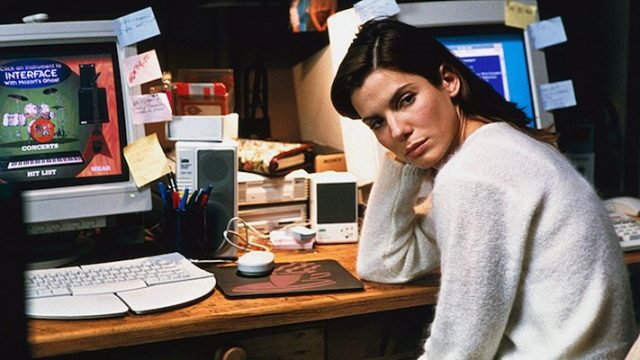
One of the things Hollywood is really good at is rushing movies into production to capitalize on hot new trends. In the late 1970s, for example, there were tons of movies about disco. The 1950s had a lot of movies about teenagers, who had recently been discovered. And in the 1940s, Hollywood just couldn’t get enough of the new “World War II” fad that was sweeping the nation.
It was this line of thinking that brought us “The Net,” a 1995 thriller about the dangers of the “Internet.” The timing was perfect. People in 1995 were familiar enough with the Internet to understand the basic concepts involved, but not so familiar with it that they’d realize how far-fetched the movie was. We were in that sweet spot between knowledge and ignorance, which is another thing Hollywood is good at exploiting.
“The Net” stars Sandra Bullock, who was fresh off her “Speed” success and hadn’t yet moved into the phase of her career where all she does is snort-laugh and spill things on herself. Here she plays Angela Bennett, a computer whiz who works for a San Francisco software company but telecommutes from her home in Southern California. She spends her non-working hours in chat rooms and has the computer read the messages out loud to her. This would be chaotic in real life, and not even possible in real life in 1995, and pointless when you’re sitting in front of the computer anyway, but it’s what she does.
The movie is very pleased with itself for showcasing the amazing powers of the Internet. It lingers for a moment every time Angela and her dial-up modem do something high-tech like confirm her airline reservations or track a FedEx package. Why, she even orders pizza online, making her the one person in 1995 who did that!
Angela’s co-worker, Dale, sends her a weird computer program that he stumbled across, one that seems to grant the user backdoor access to all manner of private databases and such. It is such a big deal that Dale hops in his private plane to fly down from San Francisco and discuss it with Angela in person, but on the way his navigation equipment fails and he crashes. How could such a thing happen? I’ll give you a hint: his navigation system relied on COMPUTERS.
Angela then goes on vacation to Cancun, where she is shmoozed on the beach by a charming Englishman named Jack Devlin (Jeremy Northam). Since he is a) charming, b) English, c) named “Jack Devlin,” and d) played by Jeremy Northam, it is safe to assume he is the bad guy. But Angela, unaccustomed to interacting with live human beings rather than hearing their chat room messages read aloud by a computerized voice, doesn’t realize that Jack is evil, and has sex with him on his yacht. She discovers, post-sex, that Jack only wants the computer disk, which for some reason Angela has with her, right now. She not only brought it with her on vacation, she walks around with it in her purse all the time, in case it becomes necessary for the plot. Jack intends to kill Angela after getting the disk, so she knocks him unconscious, escapes from the yacht in a dinghy, and immediately crashes into some rocks.
She wakes up three days later in a Mexican hospital. Very few stories with happy endings begin that way. The disk is destroyed, and everything from her purse is gone. What’s more, her identity has been changed — changed with COMPUTERS! And the INTERNET! The U.S. embassy issuing her temporary replacement passport says her name is Ruth Marx — same photo, same birthdate, same Social Security number, but different name. She returns to her hotel to find that Angela Bennett already checked out. When she gets back to L.A., her car is no longer at the airport. When she gets home, her house is for sale. The only ID she has is the temporary passport that says Ruth Marx, and while she’s trying to explain everything to the police, Jack Devlin is sitting outside in a parked car with his laptop, manually entering fake arrest warrants for Ruth Marx into the LAPD’s database. This is totally a thing that a person can do. At every turn, Angela is told a variation of the same thing: “That’s what the computer says, so there’s no point in discussing it further, with anyone, ever, because of COMPUTERS, and also THE INTERNET.”
Obviously, Angela just needs to get some of her friends and acquaintances to vouch for her identity. The movie has thought of this possible solution, however, and cleverly thwarts it by announcing that Angela doesn’t know anyone. She’s never met any of her co-workers in person. None of her neighbors has ever seen her. She has no local friends, nor apparently any friends in other cities where she has previously lived. Her only family is her mother, who conveniently has Alzheimer’s and doesn’t recognize her. (Tip for screenwriters: If the choice is between giving a character no family at all and giving her a mother whose only function in the story is to not recognize her, go with option A. It’s less tacky.)
The one person Angela actually knows is her former therapist/boyfriend, Alan Champion (Dennis Miller). He tries to help her, but this makes him a target, too. The bad guys, whoever they are, use COMPUTERS to change his prescription medication to something that will kill him, and then I guess they just hope that he gets his prescription refilled soon. He does, today! The bad guys are able to do all of these things because all computers are connected to the Internet at all times, and all of their security measures can be bypassed with one all-powerful computer program. You can see how this scenario might seem alarming and plausible to someone who doesn’t really know how the Internet works — a regular person in 1995, for example, or John McCain today.
Even Angela buys it, and she works in the computer industry. Her reaction should be, “Wait, this literally isn’t possible, given the current infrastructure and developed technology.” But instead her reaction is panic and exasperation: “Our whole lives are on the computer!” That’s really what she says. She even reiterates it: “Our whole world is sitting there in a computer! It’s all on the computer!” It’s hard to take a sexy young heroine seriously when she talks like your AOL-using aunt.
Anyway, when Angela tells the LAPD that their system must have been hacked, the LAPD says that’s not possible, because they’ve been using the fancy new Gatekeeper security program for the last six months. Ah, Gatekeeper! The movie has been mentioning Gatekeeper and its billionaire developer every few minutes, so it was only a matter of time before we’d figure out that the company is evil and is using their security software as a Trojan horse to steal everyone’s information. And once we’ve figured it out, it should only be another half-hour or so before Angela figures it out, too. Forty minutes, tops. The whole dumb movie feels like an extended warning to old people to be afraid of technology, like that “SNL” commercial for robot insurance. I saw this movie in 1995, and I’ve stayed away from the Internet ever since.
— Film.com





